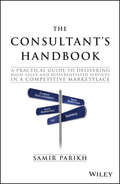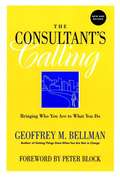- Table View
- List View
The Consistent Trader: How to Build a Winning Trading System, Master Your Psychology and Earn Consistent Profits in the Forex Market
by Sam EderThe creator of the acclaimed Forex Course for Smart Traders shows you how to trade smarter than Wall Street and quants. Most traders learn to trade the wrong way, and realize only years later that their trading system has been focused on all the wrong things. You can save yourself countless hours and dollars by learning to trade Forex based on the principles and practices of history&’s greatest traders. Discover what works and what doesn&’t. It&’s doing the simple things well that will yield the best results in trading. If you fail to master the fundamentals of successful trading, you are virtually guaranteed to fail long-term because of poor risk management. In this book you&’ll learn: · The 25 beliefs of highly successful traders and how to model them · The scientific path to financial freedom using a trading system that creates consistent profits again and again · How to develop a working model of the forex market that allows you to spot opportunities and avoid mistakes · How to get an edge and trade like the &“house&” without an algorithm or inside information · How to set simple objectives that let you risk less and win big more often · How to run your trading business like a hedge fund · The one secret the world&’s top trading psychologist recommends · How to balance your trader, analyst, and risk manager roles · The 12 daily tasks of top Forex traders · How to get in the trading zone like an elite athlete
The Constant Contact Guide to Email Marketing
by Eric GrovesThe leading email marketing firm shows you how to create high-impact, low-cost campaigns Email marketing is an incredibly cost-effective way to establish and build relationships that drive business success. But, it can also be a challenge because the inbox is a hostile environment. Whether your email is noteworthy--or an annoying waste of your customer's time--depends on your ability to stick to stick the fundamentals of good marketing and authentic relationship building. The Constant Contact Guide to Email Marketing presents best practices and relationship-building principles from America's leading email marketing firm. With over 280,000 small business and non-profit clients, Constant Contact is constantly testing and learning what works and what doesn't, and it's all here. There's no other email guide on the market that provides this level of comprehensive, practical guidance. Whether you're starting your own small business or need to grow on a shoestring budget, this book will get you up to speed fast. Learn about: Ten email pitfalls that will get your business into trouble Ten things your customers expect you to do The "soft" benefits of email marketing Using email in combination with other marketing efforts How four types of permissions can make or break your strategy Building an email list that is valuable and effective Creating valuable content Choosing an effective, professional email format Ensuring your emails are delivered, opened, and read With The Constant Contact Guide to Email Marketing, you'll learn to avoid the common mistakes of email marketing, give your customers content they love, and combine an effective email marketing strategy with your traditional marketing efforts--giving you way more bang for your marketing buck.
The Constant Economy: How to Create a Stable Society
by Zac GoldsmithA timely, inspiring manifesto combining the power of markets with the will of people to effect change for the ultimate survival of the planet Since the industrial revolution, the economies of developed nations have grown at the expense of the natural world, but the earth's resources are finite, climate change threatens to dramatically transform how and where people live, and the global economic system is in disarray. Offering an urgently needed alternative model, this book argues for the creation of a "constant economy," in which resources are valued not wasted, food is grown sustainably, and goods are built to last. The constant economy operates at the human scale, and above all it recognizes nature's limits. This book explains that almost every action needed to support the environment is already being carried out somewhere in the world, by companies, communities, and governments determined to blaze a trail. Where they have done the right thing, their customers and voters have rewarded them. Practical solutions exist, and they are brought together and set out in this groundbreaking book.
The Constitution of Liberty in the Open Economy (Routledge Foundations Of The Market Economy Ser.)
by Luder GerkenIn these heady days of ever increasing globalization it has become vital to question whether governments should be allowed to protect domestic enterprises from foreign competitors.This book represents a first attempt to provide a new conceptual basis for discussing the cases in which free trade should be the option of choice in trade policy and tho
The Constitution of Liberty: The Definitive Edition (The Collected Works of F.A. Hayek #17)
by F.A. HayekOriginally published in 1960, The Constitution of Liberty delineates and defends the principles of a free society and traces the origin, rise, and decline of the rule of law. Casting a skeptical eye on the growth of the welfare state, Hayek examines the challenges to freedom posed by an ever expanding government as well as its corrosive effect on the creation, preservation, and utilization of knowledge. In distinction to those who confidently call for the state to play a greater role in society, Hayek puts forward a nuanced argument for prudence. Guided by this quality, he elegantly demonstrates that a free market system in a democratic polity—under the rule of law and with strong constitutional protections of individual rights—represents the best chance for the continuing existence of liberty. Striking a balance between skepticism and hope, Hayek’s profound insights remain strikingly vital half a century on. This definitive edition of The Constitution of Liberty will give a new generation the opportunity to learn from Hayek’s enduring wisdom.
The Constitution of Liberty: The Definitive Edition (The\collected Works Of F. A. Hayek Ser. #17)
by F.A. A. HayekFrom the $700 billion bailout of the banking industry to president Barack Obama’s $787 billion stimulus package to the highly controversial passage of federal health-care reform, conservatives and concerned citizens alike have grown increasingly fearful of big government. Enter Nobel Prize–winning economist and political theorist F. A. Hayek, whose passionate warning against empowering states with greater economic control, The Road to Serfdom, became an overnight sensation last summer when it was endorsed by Glenn Beck. The book has since sold over 150,000 copies.The latest entry in the University of Chicago Press’s series of newly edited editions of Hayek’s works, The Constitution of Liberty is, like Serfdom, just as relevant to our present moment. The book is considered Hayek’s classic statement on the ideals of freedom and liberty, ideals that he believes have guided—and must continue to guide—the growth of Western civilization. Here Hayek defends the principles of a free society, casting a skeptical eye on the growth of the welfare state and examining the challenges to freedom posed by an ever expanding government—as well as its corrosive effect on the creation, preservation, and utilization of knowledge. In opposition to those who call for the state to play a greater role in society, Hayek puts forward a nuanced argument for prudence. Guided by this quality, he elegantly demonstrates that a free market system in a democratic polity—under the rule of law and with strong constitutional protections of individual rights—represents the best chance for the continuing existence of liberty. Striking a balance between skepticism and hope, Hayek’s profound insights are timelier and more welcome than ever before. This definitive edition of The Constitution of Liberty will give a new generation the opportunity to learn from his enduring wisdom.
The Constitution of Markets: Essays in Political Economy (Foundations Of The Market Economy Ser.)
by Viktor J VanbergWhat is the nature and role of competition in markets and politics?This book examines the institutional dimension of markets and the rules and institutions that condition the operation of market economies. Particular attention is paid to the the role of the state, specifically the role of governments in shaping and maintaining the economic constitu
The Constitution of Political Economy: Polity, Society and the Commonweal
by Adrian Pabst Roberto ScazzieriThe two dominant conceptions of political economy are based on either reducing political decisions to rational-choice reasoning or, conversely, reducing economic structures and phenomena to the realm of politics. In this book, Adrian Pabst and Roberto Scazzieri contend that neither conception is convincing and argue for a fundamental rethinking of political economy. Developing a new approach at the interface of economic theory and political thought, the book shows that political economy covers a plurality of dimensions, which reflect internal hierarchies and multiple relationships within the economic and political sphere. The Constitution of Political Economy presents a new, richer conception of political economy that draws on a range of thinkers from the history of political economy, recognising the complex embedding of the economy and the polity in society. Effective policy-making has to reflect this embedding and rests on the interdependence between local, national, and international actors to address multiple systemic crises.
The Constitution of the Post-Economic State: Post-Industrial Theories and Post-Economic Trends in the Contemporary World (Routledge Revivals)
by Vladislav L. InozemtsevFirst published in 1998, this author illustrates clearly how, on the threshold of the new millennium, the world is entering a post-economic era. On the basis of a comprehensive analysis of modern socio-economic trends, the author brings forward a new paradigm for understanding contemporary economic processes that change the substance of our civilization.
The Constitutional Logic of Affirmative Action
by Ronald J. FiscusFew issues are as mired in rhetoric and controversy as affirmative action. This is certainly no less true now as when Ronald J. Fiscus's The Constitutional Logic of Affirmative Action was first published in 1992. The controversy has, perhaps, become more charged over the past few years. With this compelling and rigorously reasoned argument for a constitutional rationale of affirmative action, Fiscus clarifies the moral and legal ramifications of this complex subject and presents an important view in the context of the ongoing debate. Beginning with a distinction drawn between principles of compensatory and distributive justice, Fiscus argues that the former, although often the basis for judgments made in individual discrimination cases, cannot sufficiently justify broad programs of affirmative action. Only a theory of distributive justice, one that assumes minorities have a right to what they would have gained proportionally in a nonracist society, can persuasively provide that justification. On this basis, the author argues in favor of proportional racial quotas--and challenges the charge of "reverse discrimination" raised in protest in the name of the "innocent victims" of affirmative action--as an action necessary to approach the goals of fairness and equality. The Constitutional Logic of Affirmative Action focuses on Supreme Court affirmative action rulings from Bakke (1976) to Croson (1989) and includes an epilogue by editor Stephen L. Wasby that considers developments through 1995. General readers concerned with racial justice, affirmative action, and public policy, as well as legal specialists and constitutional scholars will find Fiscus's argument passionate, balanced, and persuasive.
The Constraints Management Handbook (The CRC Press Series on Constraints Management)
by Michael S. Spencer III CoxA new approach to improving the production of goods and services, Constraints Management (CM), recognizes the powerful role of the constraint (the limiting resource) in determining the output of the entire production system. By learning about and mastering CM concepts, managers can improve their companies' present output and plan for future growth as well.
The Construction Project: Imagining Reality--The Integrative Thinker's Stance
by Roger L. MartinThis chapter reviews the six essential elements for developing an integrative thinking stance about the world and about yourself-the foundation of your personal knowledge system, and the key to learning how to fashion creative resolutions from opposing ideas.
The Construction Technology Handbook
by Hugh SeatonTired of new software that doesn’t seem to work in the field? Ready to get your teams up to speed and productive with the latest tools? The Construction Technology Handbook takes a ground up, no jargon look at technology in the construction industry. From clear, quickly grasped explanations of how popular software actually works to how companies both large and small can efficiently try out and onboard new tools, this book unlocks new ways for construction field teams, firm owners, managers, leaders, and employees to do business. You’ll learn about: Simple frameworks for making sense of all the new options cropping up How software and data work and how they work together to make your job easier and safer What artificial intelligence really is and how it can help real companies today Tools that are just over the horizon that will, one day, make your job just a little bit easier New and practical resources to help you incorporate an attitude of innovation and technology adoption into your workplace Perfect for general contractors and subcontractors, The Construction Technology Handbook also belongs on the bookshelves of construction technology vendors and construction workers who want to better understand the needs of the construction industry and the inner workings of construction technology, respectively.
The Construction of Corporate Identities by Chinese and American Airlines on Social Media: A Cross-Cultural Multimodal Study
by Ying HuaUsing top Chinese and American airlines as examples, this book approaches the construction of corporate identities on social media, a critical issue in corporate communication, from a cross-cultural multimodal perspective. Through a holistic and systematic multimodal analysis, it provides a comprehensive cross-cultural understanding of corporate identity construction on social media. By developing an integrated social semiotic framework based on registerial cartography in SFL, it investigates the airlines’ registerial activity patterns in terms of macro-level configuration and micro-level multimodal realizations, interprets their situated contextual patterns that delineate the construction of corporate identities and further explains the influence of cultural factors. Given that this book offers theoretical contributions to corporate identity and cross-cultural communication research, practical guidance on PR practices, especially in the context of Chinese enterprises going global, and pedagogical insights for business communication courses, this book will be of particular benefit to researchers in linguistics, management and communication studies, PR practitioners, and both lecturers and learners of business communication courses.
The Consultant's Handbook
by ParikhDelivers the essential practical skills needed to consult and make sharp, well prepared interactions in a wide range of business situations This comprehensive handbook covers the fundamental skills and attitudes required by successful consultants from novice to practitioner level, irrespective of their specialist area. It untangles the key variables present in any consulting service and introduces practical ways to improve their effectiveness based upon the author's experience of helping consulting organisations to develop and excel in the marketplace. The book explores consulting 'from the ground up' steering away from theory and focusing instead on practical application, providing a solid platform upon which to build further domain-specific competence. The Consultant's Handbook provides: An understanding of the key variables that can be addressed in order to improve one's own consulting performance A set of simple practices that can be implemented with immediate benefit to the reader Practical insight into day-to-day real life consulting interactions Confidence to implement the new ideas and approaches
The Consultant's Quick Start Guide
by Elaine BiechThe Consultant's Quick Start Guide offers a practical approach to setting up a consulting business. Throughout the guide, Elaine Biech--author of the best-selling The Business of Consulting--shares both her own secrets as well as those of numerous other successful consultants. With a focus on the business side of consulting, Biech takes you through a painless, fill-in-the-blanks, step-by-step process for setting up your consulting firm. New sections include:Why A Consulting Career--Five Reasons Why You May Be a Good InvestmentHow Much Will Clients Pay?Your first "To Do" ListWhat to call your businessCreating and writing Business PlansOffice Location OptionsSetting up your office, including Furnishing Your Office and planning your Technical NeedsElectronic Records, including Monthly Expense Records, Revenue Projections, and InvoicingStaying Organized, including a Session PlannerDetermining your market nicheCreating your marketing planDeveloping your websiteReviewing your first year with your familyElectronic resource list, available onlineSkills And Knowledge Required of Consultants
The Consultants Calling: Bringing Who You Are To What You Do (The Jossey-Bass Business & Management Series)
by Geoffrey BellmanGeoffrey Bellman reveals how to make the job rewarding both financially and personally as he examines the practical issues of managing time,clients, and money as well as such broader concerns as how to balance work with family life. <P><P>At once practical and personal, this book is for all types of consultants, all those who work with consultants, and all those who dream of being consultants.
The Consulting Bible
by Alan WeissEverything you need to know about building a successful, world-class consulting practiceWhether you are a veteran consultant or new to the industry, an entrepreneur or the principal of a small firm, The Consulting Bible tells you absolutely everything you need to know to create and expand a seven-figure independent or boutique consulting practice. Expert author Alan Weiss, who coaches consultants globally and has written more books on solo consulting than anyone in history, shares his expertise comprehensively.Learn and appreciate the origins and evolution of the consulting professionLaunch your practice or firm and propel it to top performanceImplement your consulting strategies in public and private organizations, large or small, global or domesticSelect from the widest variety of consulting methodologiesAchieve lasting success in your professional career and personal goalsThe author is recognized as "one of the most highly regarded independent consultants in America" by the New York Post and "a worldwide expert in executive education" by Success MagazineWhether you're just starting out or looking for the latest trends in modern practice, The Consulting Bible gives you an unparalleled toolset to build a thriving consultancy.
The Consulting Bible: How to Launch and Grow a Seven-Figure Consulting Business
by Alan WeissThe new edition of bestselling real-world guide to consultancy success, from the “Rock Star of Consulting” Alan Weiss The second edition of The Consulting Bible: Everything You Need to Know to Create and Expand a Seven-Figure Consulting Practice remains the most comprehensive and practical guide to the consulting profession, from launch to high growth, from marketing to implementation. Legendary consultant, speaker, and bestselling author Alan Weiss shows you how to create an independent or boutique consulting practice and take it to seven-figure success. Step-by-step, this invaluable resource guides you through attracting clients, maximizing your value, and achieving your career goals. In the decade since the first publication of The Consulting Bible, an array of significant developments has dramatically impacted the consulting profession: shifts in social consciousness, the Covid-19 pandemic, tele-consulting and virtual meetings, the globalization of the economy, the growth of social media, and many more. This exhaustively revised new edition provides specific approaches and techniques for mastering the new consulting environment and turning volatility and disruption into unlimited opportunities. Designed to help you become the authority and expert that organizations turn to again and again, this book is your one-stop resource for: Building a strong global brand that draws people to you Marketing remotely to reduce costs and allow for higher fees Mastering the latest implementation techniques Forging strong relationships with the buyers of a new generation Selecting the consulting methodology that best fits your requirements Writing proposals and creating testimonials and references Using advanced technology to sell and deliver your services Written for newcomers and veterans alike, The Consulting Bible: Everything You Need to Know to Create and Expand a Seven-Figure Consulting Practice, Second Edition, is essential reading for every solo consultant, entrepreneur, and principal of a small consulting firm.
The Consumer . . . or Else!: Consumer-Centric Business Paradigms
by Donald F Dufek Camille P Schuster"The customer is the only one who can fire all of us." -Sam Walton Doing business in today's economy and surviving requires a new paradigm. Who are at the center of this new approach to doing business? CONSUMERS. Historically, power struggles have raged between suppliers and distributors. Recently, both parties awakened to the fact that neither of them has the ultimate power . . . it now resides solely with the consumer. This valuable book describes what demassification of the consumer market means and will show you how-and why-businesses must adapt to succeed. Handy charts, tables, and illustrations make the information easy to understand, and fascinating sidebar quotations from well-known leaders of various industries-Sam Walton, Jack Welch, and many more-give the book a unique and memorable flavor. "Consumers," say the authors, "not only demand higher quality and lower prices, but also expect convenient, quick, customized service. They expect in-stock conditions and quality. They demand value and respect. Global markets mean large numbers of consumers, but these consumers want to be treated as individuals, and the mass market no longer exists. Companies in industries from financial services to groceries to consumer goods to health care to hardware to automobiles are adopting these new business processes and winning in the marketplace. Their competitors are falling by the wayside." This essential book: examines the factors that are shaping the current business environment and looks at the re-orientation of today's consumer, presenting global perspectives on these vital issues explores this new consumer-centric approach from the perspectives of suppliers, intermediaries, and retailers, as well as the business processes being used to create more efficient supply chains and more effective demand fulfillment processes shows you the tools that can be used to implement this new business paradigm in the areas of technology, internal business processes, and collaboration answers frequently asked questions shares the success stories of Rite Aid, Southwest Airlines, Starbucks, Snap-On Tools, National Semiconductor, and others! After addressing the issues of why business must change and examining the significance of a global business environment, The Consumer . . . or Else! addresses each element of the new business paradigm: the new role of consumers major players, including the shift in the business processes of retailers and manufacturers and the role of intermediaries new business processes, with a focus on technology, internal coordination, and collaboration Companies from Dell Computer to Del Monte are putting consumers first and reaping the sales benefits. General Mills will soon provide consumers with the opportunity to create and name their own custom cereal. As the authors point out, "The business process is changing-changing the way product flows, the way information flows, and the way cash flows. Companies that recognize this need to change will hold huge competitive advantages, and the companies that fail to adapt will simply not be here in the future." Let The Consumer . . . or Else!: Consumer-Centric Business Paradigms be your guidebook to this challenging new business climate.
The Consumer Benchmarks in the Unfair Commercial Practices Directive
by Bram B. DuivenvoordeThis book investigates the regime of consumer benchmarks in the Unfair Commercial Practices Directive and explores to what extent this regime meets each of the goals of the Directive. In particular, it assesses whether the consumer benchmarks are suitable in terms of achieving the three goals of the Directive: achieving a high level of consumer protection, increasing the smooth functioning of the internal market, and improving competition in the market as such. In addition to providing a thorough analysis of the consumer benchmarks and their relationship to the goals of the Directive, at a more practical level, the book provides insight into the working and consequences of the benchmarks that can be used in the evaluation of the Unfair Commercial Practices Directive and its application by the CJEU. This assessment is important because the Directive, while promising to regulate unfair commercial practices in a way that achieves the Directive's goals, has removed the possibility for Member States to regulate unfair commercial practices themselves.
The Consumer Co-operative Sector: International Perspectives on Strategic Renewal (Routledge Studies in International Business and the World Economy)
by John F. Wilson Anthony Webster Espen Ekberg Samuli SkurnikGlobally, consumer co-operation has experienced a difficult period since the 1970s. Large scale failures in France, Germany and Austria were accompanied by loss of market share in the UK (including the failure of the Scottish Co-operative Wholesale Society and its takeover by its English counterpart). Even in the Nordic countries, where consumer co-operation has always been more robust, new challenges from the non-co-operative sector had to be confronted. How did co-operative organizations in different countries cope with these challenges? What were the processes of strategic renewal that they undertook? How successful were they? These are the key questions that the collection will address, culminating in an analysis by the editors of the effectiveness of strategic renewal in the co-operative sector. This book is a study of strategic renewal in the consumer co-operative sector, using eleven international case-studies to demonstrate how the concept has been applied over the last fifty years.
The Consumer Co-operative Sector: International Perspectives on Strategic Renewal (Routledge Studies in International Business and the World Economy)
by John F. Wilson Anthony Webster Espen Ekberg Samuli SkurnikGlobally, consumer co-operation has experienced a difficult period since the 1970s. Large scale failures in France, Germany and Austria were accompanied by loss of market share in the UK (including the failure of the Scottish Co-operative Wholesale Society and its takeover by its English counterpart). Even in the Nordic countries, where consumer co-operation has always been more robust, new challenges from the non-co-operative sector had to be confronted. How did co-operative organizations in different countries cope with these challenges? What were the processes of strategic renewal that they undertook? How successful were they? These are the key questions that the collection will address, culminating in an analysis by the editors of the effectiveness of strategic renewal in the co-operative sector. This book is a study of strategic renewal in the consumer co-operative sector, using eleven international case-studies to demonstrate how the concept has been applied over the last fifty years.
The Consumer Revolution: Tipping the Balance of Power
by Naren NathIn this ground breaking book, Naren Nath provides a sweeping narrative of revolutions since the dawn of human civilization, leading up to the current and most impactful of them all—the consumer revolution. The book paints a gripping picture of consumers melding together, akin to nuclear fusion, to unleash unprecedented amount of energy and creativity, setting in motion a stunning transfer of power from traditional institutions. In doing so, it tosses up myriad new business ideas, and also highlights some of the sinister implications if the revolution is not harnessed correctly. The Consumer Revolution provides a fascinating context and rationale for some of the biggest current events and trends around the world. It is a stirring call for action to billions of everyday consumers to express their will and wield power in this ultimate doctrine of consumer empowerment.
The Consumer Society Reader
by Juliet Schor D. B. HoltThe Consumer Society Reader features a range of key works on the nature and evolution of consumer society. Included here is much-discussed work by leading critics such as Jean Baudrillard, Susan Bordo, Dick Hebdige, bell hooks, and Janice Radway. Also included is a full range of classics, such as Frankfurt School writers Adorno and Horkheimer on the Culture Industry; Thorstein Veblen's oft-cited writings on "conspicuous consumption"; Betty Friedan on the housewife's central role in consumer society; John Kenneth Galbraith's influential analysis of the "affluent society"; and Pierre Bourdieu on the notion of "taste.""Consumer society--the 'air we breathe,' as George Orwell has described it--disappears during economic downtruns and political crises. It becomes visible again when prosperity seems secure, cultural transformation is too rapid, or enviornmental disasters occur. Such is the time in which we now find ourselves. As the roads clog with gas-guzzling SUVs and McMansions proliferate in the suburbs, the nation is once again asking fundamental questions about lifestyle. Has 'luxury fever,' to use Robert Frank's phrase, gotten out of hand? Are we really comfortable with the 'Brand Is Me' mentality? Have we gone too far in pursuit of the almighty dollar, to the detriment of our families, communities, and natural enviornment? Even politicians, ordinarily impermeable to questions about consumerism, are voicing doubts... [and] polls suggest majorities of Americans feel the country has become too materialistic, too focused on getting and spending, and increasingly removed from long-standing non-materialist values." -From the introduction by Douglas B. Holt and Juliet B. Schor























